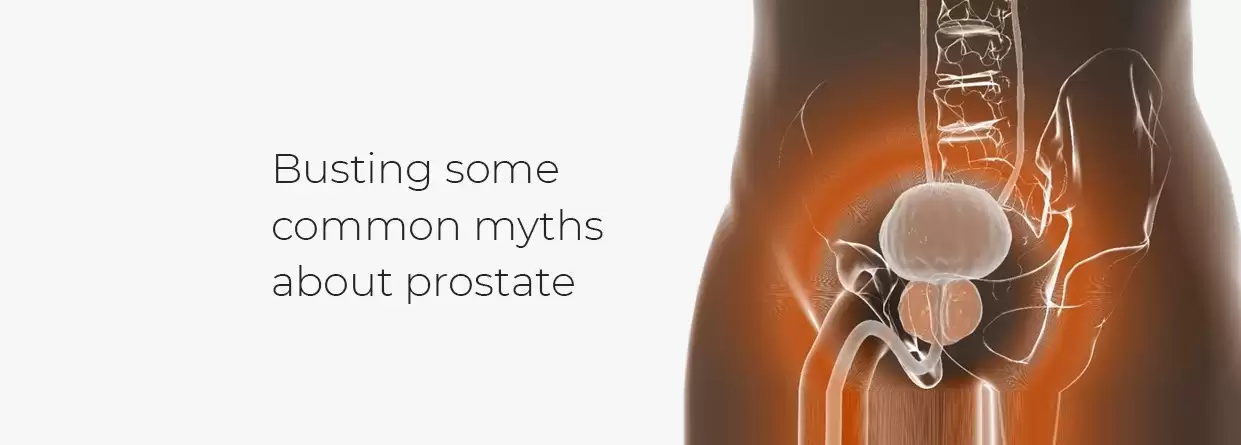
 Emergency No: 08062136598
Emergency No: 08062136598
Renal Sciences | by CMRI | Published on 14/12/2021
The prostate is a reproductive gland found in males, that is responsible for the secretion of seminal fluids. Prostate-related problems are quite common in men above 55 years of age, though these can affect males of any age group. In the previous blog, we busted three common myths associated with prostate cancer with the help of the best prostate surgeon in Kolkata.
These were
Myth 1 - You do not have prostate cancer if you are not experiencing the symptoms
Myth 2 - You should not be concerned about benign prostatic hyperplasia if you do not experience any significant change in the size of your prostate
Myth 3 - You cannot do anything to prevent/treat benign prostatic hyperplasia
In this blog, we are going to bust some more myths, as listed by the top prostate specialist in Kolkata.
Myth - You should not be concerned about prostate cancer as it grows at a very slow pace
Truth - This might be true in some cases but not always. There are about 29 different types of prostate cancer, some of which are quite aggressive and others are slow-growing. Some can even prove to be life-threatening. Whether your prostate cancer is dangerous or not is determined by your doctor after carrying out a thorough evaluation and assessment. If your biopsy has confirmed that you have prostate cancer, you should go for further evaluation to determine what kind of cancer you have. What follows, in terms of treatment, will entirely depend upon this. Apart from the type of cancer your age and overall health are also taken into consideration. Some patients might have an underlying condition that may aggravate their cancer, despite not being that aggressive. So it is always better to not reach any conclusion without professional medical health. Even if the cancer is aggressive, there are a variety of advanced treatment options available nowadays that can help in its effective management.
Myth - You cannot have prostate cancer if you do not have a family history of the same.
Truth - If you think that not having a family history of prostate cancer makes you immune to it, you are wrong. No doubt family history is a major risk factor but it is not the only one. A man is twice as likely to develop prostate cancer if his father or brother has the same. People having a genetic history of prostate cancer are at greater risk of having it. However, as per the best urologist in Kolkata, there are multiple other factors that can increase your susceptibility to prostate cancer. Hence, it is important to go for regular screenings, even if you do not have a family history of prostate cancer.
Myth - PSA test is only recommended for the diagnosis of prostate cancer
Truth - PSA is a special test that helps in assessing the levels of prostate-specific antigen. PSA production can be triggered in response to different diseases or ailments that can affect the prostate, including prostatitis, benign prostatic hyperplasia, or even cancer. PSA test will not help to determine the underlying problem but it will surely help to detect that something is wrong with your prostate gland. In order to know the exact reason of rising of prostate-specific antigen levels, one might require to consult a specialist for further diagnosis.
Myth - Benign prostatic hyperplasia can only affect older men.
Truth - There is a common misconception that benign prostatic hyperplasia can only affect old men and young men should not be worried about it. It is important to understand that being young does not negate your risks of developing benign prostatic hyperplasia. The vulnerability of having prostate hyperplasia has nothing to do with the age of a person.
Myth - There is a link between benign prostatic hyperplasia and prostate cancer
Truth - This, again, is false. Benign prostatic hyperplasia and prostate cancer are two different conditions that may trigger somewhat similar symptoms. This could be one of the reasons why people often confuse the two to be interrelated. Benign prostatic hyperplasia, as the name suggests, is a benign condition which means that it is non-cancerous in nature. Prostate cancer, on the other hand, is malignant. You can have either of the two problems or both of them simultaneously, but this does not mean that these are related. Both require different treatments, the only thing that is common between them is that they both affect the prostate gland.
To know more about the prostate gland and the problems related to it, consult CMRI experts today.